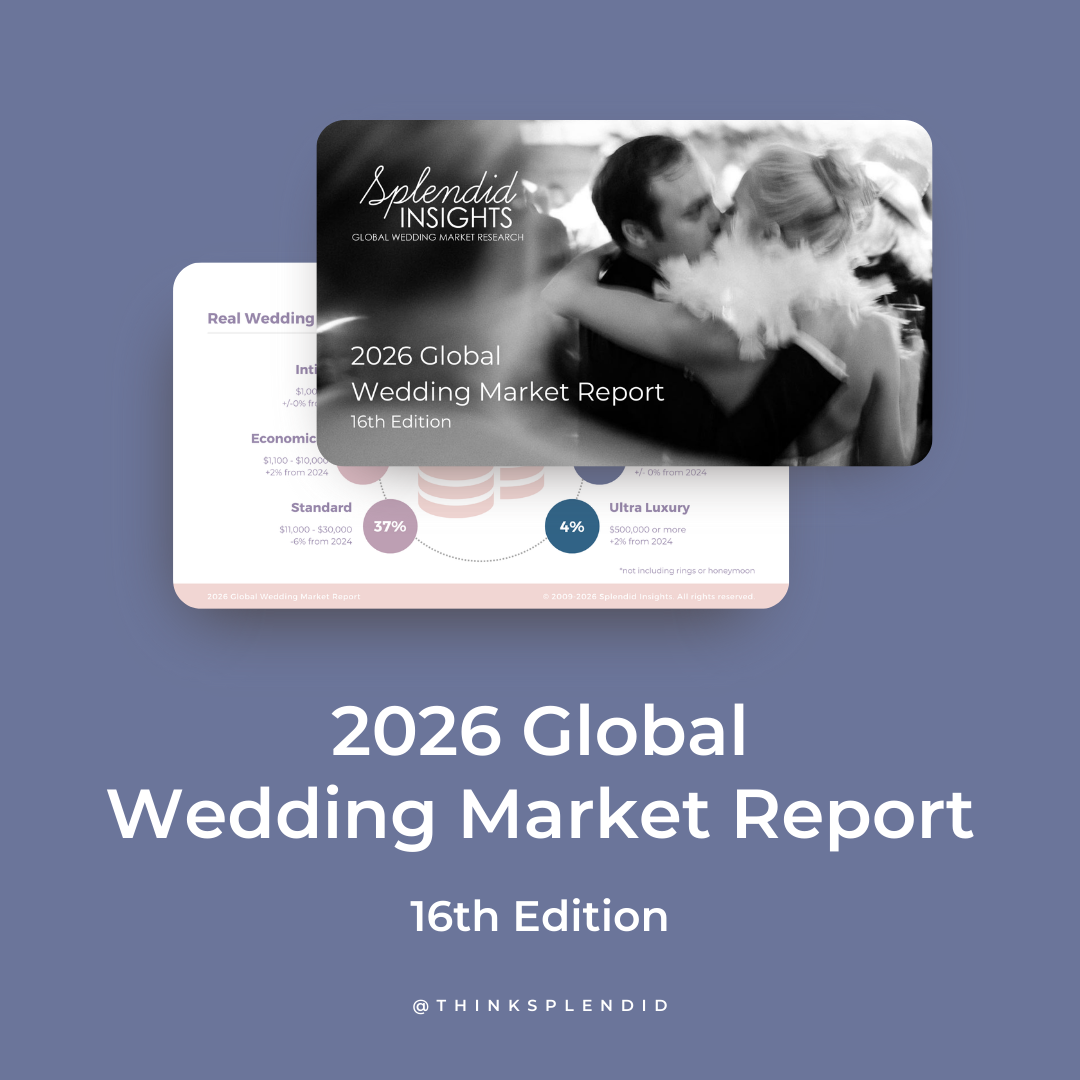Lessons from my own mistakes
Photo by Cameron Clark
In 2008, I wrote a series here on Think Splendid called "Lessons in Burnout" with insights gleaned from an experience in my previous career of not just burning out, but burning to an unrecognizable crisp. It is still – 16 years later – one of the most popular topics I've ever covered.
Burnout is a slippery slope and one we often don't see coming until it's too late.
Working in a high-touch, highly personalized industry like weddings — where purchase decisions are driven more by emotion than in any other field — makes a person more susceptible to burnout.
Add a pandemic-induced wedding boom followed by a sluggish season of inquiries to the mix and burnout becomes even more likely.
Working to make the world a better place through change or celebration is admirable, but a savior complex is not. You can’t do everything and you aren’t meant to (that cheesy line, "We're meant to be human beings, not human doings" is true).
Neglecting your own family in order to help other families isn't something to brag about and it usually means you’re halfway down the slippery slope to burnout, if not engulfed in flames already.
I certainly don't have everything figured out, but here are some things I've learned as someone who has personally been through burnout before and who has worked hard to avoid it ever since.
None of these insights are groundbreaking, but there may be one or two you're currently avoiding that can help make your current life better:
1. Take care of your brain
Your brain is in your body. Take care of your body.
2. Eat breakfast
Drink water. Take vitamins.
3. Eat well
I tend to follow Michael Pollan’s three rules: eat real food (aka pronounceable ingredients your great grandmother would recognize), mostly plants, not too much.
At the same time, there is no "organic Oreo" that tastes as good as the real thing in all its processed glory. For some people, "all or nothing" works well. For others, being stringent and then having a cheat day works. For me, a loose 80/20 rule of moderation is what works best.
4. Exercise
I’ve long preferred the Ballet Beautiful workouts while traveling because they can be accessed from any device and easily done in a hotel room.
In 2020 though, when gyms (and my local Flywheel studio) shut down, I became addicted to everything the Peloton app has to offer: spin, pilates, barre, yoga, etc. I also love their meditations, so much so that I canceled my other meditation app.
This past year I began supplementing some of the app’s classes with the free pilates classes that Move With Nicole offers on YouTube.
I still track these through the “Just Work Out” feature on the Peloton app so I can get the blue dot. What can I say? I’m a millennial who grew up in the era of measuring goals through earning gold stars and personal pan pizzas.
5. Live beyond the end of your driveway
Living “beyond the end of your driveway” doesn’t mean traveling to far-flung locales. It means getting involved in something bigger than yourself.
Give to and volunteer with charities that are tackling issues you’re passionate about, not necessarily the ones that will bring you the best PR.
Generosity is a muscle and the more you use it, the stronger it gets. Don’t be afraid of starting small: if you aren’t generous with $10, you won’t be generous with $10,000.
If giving is new to you, consider donating $1 from every sale you make this year.
6. Plan your days, but hold those plans loosely
Productivity is great, turning productivity into an idol is not.
There’s a quote by Alain de Botton that I love because it is true, true, true: “There is no such thing as work-life balance. Everything worth fighting for unbalances your life.”
Set goals and make plans, but don’t delude yourself into thinking a fancy day planner or high-tech app will control all the curveballs life throws your way.
Hopefully the pandemic finally put to rest the toxic idea that we can control any of that at all. All we can do is get up every morning and choose whether current events are going to make us bitter or better.
7. Start liking Mondays
Mondays represent a clean slate and fresh start. We all have days we dislike our jobs, but for many people what we do is a dream job.
If you dread going to work each week, consider what needs to happen in order to transition to something else and start working toward that.
8. If you're considering hiring a life coach, spend the money on a licensed therapist instead
Don't just google any therapist and pick whoever comes up first — get recommendations for a reputable professional who is committed to your wholeness, not to having you in therapy forever.
One silver lining of the pandemic is that a lot of therapists have continued offering sessions over Zoom.
A side note: we all have issues — some we don't even know exist — and there is no shame in a commitment to living as a whole person. If this is a concept you're still wrapping your head around, start out with Brené Brown's books, The Gifts of Imperfection or Daring Greatly, which are both based on scientific research and not sketchy pop psychology.
9. Keep a gratitude journal
Paper or phone app, or even Instagram, it doesn’t matter. If you’re glad for something, write it down or snap a photo, no matter how small or dumb it seems.
I literally have “glitter” as an entry in mine because glitter is fun and cheerful and abundant at the holidays, so yes, I am thankful for it.
10. Listen as if you’re wrong
This doesn’t mean compromising your values. It means leaning into the mystery of life and operating from a core belief that you may not have everything 100% figured out and that everyone you meet knows something you don't.
11. Use social media to expand your point of view, not to keep up with the Joneses
My friend Marcy Blum refers to the latter as "compare and despair,” and the good news is that it is avoidable without giving up social media altogether.
Threads has exploded, especially after recently launching in the EU. Their algorithm is still a bit all over the place in my opinion, but I have already been introduced to a bunch of people in other industries I had never met before and who have opinions that are thought-provoking.
Threads works like early days Twitter — conversational, water cooler style. A good rule of thumb: keep any self-promotional or marketing posts to 1 in 10 at a minimum, 1 in 20 is even better.
You can learn a ton about different cultures (and subcultures) – including customs, values, etc – just from spending some time on TikTok.
Your brain processes social media as an in-person interaction, so if it's constantly draining you, change who you follow. If you find yourself dealing with envy or comparison, take a break and use that time to dig into the root of that issue in yourself.
12. Take a real vacation
This one is easier said than done, especially right now at the beginning of the year when prime wedding dates are still up for grabs and Valentine’s Day proposals haven’t happened yet. That said, you can make it a priority right now by planning for it, including creating a budget line item for your next true vacation.
Destination weddings and business FAM trips or conferences are not vacations, even if they’re in exotic locations and even if they’re fun (your job is supposed to be fun). You still have to be "on" for them and you aren’t able to fully disconnect.
A self-described workaholic friend of mine a couple decades older than I am once told me that he and his wife never once regretted taking a vacation but there were several over the years that they regretted not taking.
Give yourself a break and unplug.
The original version of this post was published in 2008.
Written by
LIENE STEVENS
Liene Stevens, the founder and CEO of Think Splendid, is an author, speaker, award-winning luxury business strategist and behavioral psychologist.
* * *
Founded in 2005 and trusted by clients in 97 countries, Think Splendid is the global leader in wedding business consulting.
We provide strategic guidance to industry leaders, luxury brands, hotels, and tourism destinations that serve high net worth and ultra-high net worth brides, grooms, and wedding guests.


























